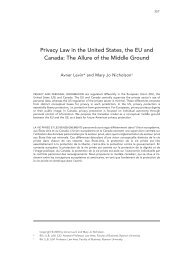Commentary on Fichte's “The Illegality of the Unauthorised ... - uoltj
Commentary on Fichte's “The Illegality of the Unauthorised ... - uoltj
Commentary on Fichte's “The Illegality of the Unauthorised ... - uoltj
You also want an ePaper? Increase the reach of your titles
YUMPU automatically turns print PDFs into web optimized ePapers that Google loves.
(2008) 5:1&2 UOLTJ 141<br />
<str<strong>on</strong>g>Commentary</str<strong>on</strong>g> <strong>on</strong> Fichte 147<br />
<strong>the</strong> local ruler, though it was also occasi<strong>on</strong>ally granted to authors. 25 While it might<br />
appear that <strong>the</strong> idea <strong>of</strong> privilege was an early form <strong>of</strong> copyright protecti<strong>on</strong>, in<br />
fact, it was aimed at ensuring <strong>the</strong> viability <strong>of</strong> a printer’s business ra<strong>the</strong>r than being<br />
a recogniti<strong>on</strong> <strong>of</strong> <strong>the</strong> author’s property right in <strong>the</strong> book. 26 As well, <strong>the</strong> privilege<br />
did not really afford legal protecti<strong>on</strong>, since it was a c<strong>on</strong>diti<strong>on</strong>al grant to a printer<br />
ra<strong>the</strong>r than a law derived from <strong>the</strong> right <strong>of</strong> <strong>the</strong> author.<br />
This background is important to keep in mind because Fichte <strong>of</strong>ten refers<br />
to <strong>the</strong> system <strong>of</strong> privilege in his article. For Fichte, <strong>the</strong> granting <strong>of</strong> privilege is <strong>the</strong><br />
creati<strong>on</strong> <strong>of</strong> a positive law which is an excepti<strong>on</strong> to a natural law. If <strong>the</strong> positive<br />
law forbids <strong>the</strong> reprinting <strong>of</strong> books for a limited period, <strong>the</strong>n <strong>the</strong> natural law to<br />
which it is an excepti<strong>on</strong> must be a permissive law allowing any<strong>on</strong>e to reprint a<br />
book. However, Fichte disagrees that this is <strong>the</strong> natural law view <strong>of</strong> ownership in<br />
a creative work. He goes <strong>on</strong> to dem<strong>on</strong>strate that books differ from o<strong>the</strong>r goods<br />
for which privileges are granted. As a result, <strong>the</strong> system <strong>of</strong> privilege is unsuited<br />
to <strong>the</strong>m. Books should not be protected against reprinting as an excepti<strong>on</strong> to a<br />
permissive natural right. Instead, he argues that <strong>the</strong>re is a natural property right in<br />
books derived from <strong>the</strong> nature <strong>of</strong> <strong>the</strong> book and <strong>the</strong> nature <strong>of</strong> <strong>the</strong> human creative<br />
process. The prohibiti<strong>on</strong> <strong>on</strong> <strong>the</strong> reprinting <strong>of</strong> books follows from an innate right,<br />
and any utilitarian arguments aimed at undermining <strong>the</strong> granting <strong>of</strong> privilege<br />
to a publisher or printer thus misses <strong>the</strong> mark, since <strong>the</strong>y do not c<strong>on</strong>sider <strong>the</strong><br />
relati<strong>on</strong>ship between <strong>the</strong> author and her work as determinative <strong>of</strong> <strong>the</strong> relati<strong>on</strong>ship<br />
between <strong>the</strong> author and <strong>the</strong> public.<br />
*<br />
3. FICHTE’S PLACE IN GERMAN PHILOSOPHY<br />
before turning to an interpretati<strong>on</strong> <strong>of</strong> fichte’s views <strong>on</strong> intellectual<br />
property, a few words about Fichte’s place in German philosophy <strong>of</strong> <strong>the</strong><br />
eighteenth- and nineteenth-centuries might be helpful. Fichte initially perceived<br />
himself as an interpreter <strong>of</strong> Immanuel Kant. 27 He was inspired by Kantian<br />
philosophy, but, in his view, some difficulties with Kant’s views remained to be<br />
solved. One <strong>of</strong> <strong>the</strong> primary difficulties that Fichte saw with Kantian philosophy<br />
was that it did not appear to deal adequately with scepticism. The primary<br />
culprit, according to Fichte and many <strong>of</strong> Kant’s critics, was Kant’s dualism—his<br />
view that sensibility and <strong>the</strong> understanding, or appearance and c<strong>on</strong>cepts—were<br />
separate. 28 This separati<strong>on</strong> led to scepticism because it suggested that all<br />
knowledge <strong>of</strong> <strong>the</strong> external world is subjective, as we can <strong>on</strong>ly know it by means<br />
<strong>of</strong> our senses. A related problem was Kant’s claim that <strong>the</strong> nature <strong>of</strong> human<br />
knowledge meant that “things in <strong>the</strong>mselves” could never be known in any way<br />
o<strong>the</strong>r than through our subjective sensible capacity. 29<br />
25. Rose, Authors and Owners, supra note 12 at pp. 10–11; John Fea<strong>the</strong>r, “From Rights in Copies to Copyright:<br />
The Recogniti<strong>on</strong> <strong>of</strong> Authors’ Rights in English Law and Practice in <strong>the</strong> Sixteenth and Seventeenth Centuries,”<br />
in Woodmansee and Jaszi, eds., The C<strong>on</strong>structi<strong>on</strong> <strong>of</strong> Authorship, supra note 20, 191–209 at pp. 192–193.<br />
26. Woodmansee, <strong>“The</strong> Genius and <strong>the</strong> Copyright,” supra note 13 at p. 437.<br />
27. Peter Baumanns, JG Fichte: Kritische Gesamtdarstellung seiner Philosophie (Karl Alber, 1990) at p. 20.<br />
28. Frederick Beiser, <strong>“The</strong> Enlightenment and Idealism,” in Karl Ameriks, ed., The Cambridge Compani<strong>on</strong> to<br />
German Idealism (Cambridge University Press, 2000) 18–36 at p. 29; Peter Rohs, Johann Gottlieb Fichte<br />
(Beck, 1991) at pp. 32–33.<br />
29. Rohs, Johann Gottlieb Fichte, supra note 28 at pp. 33–34.









